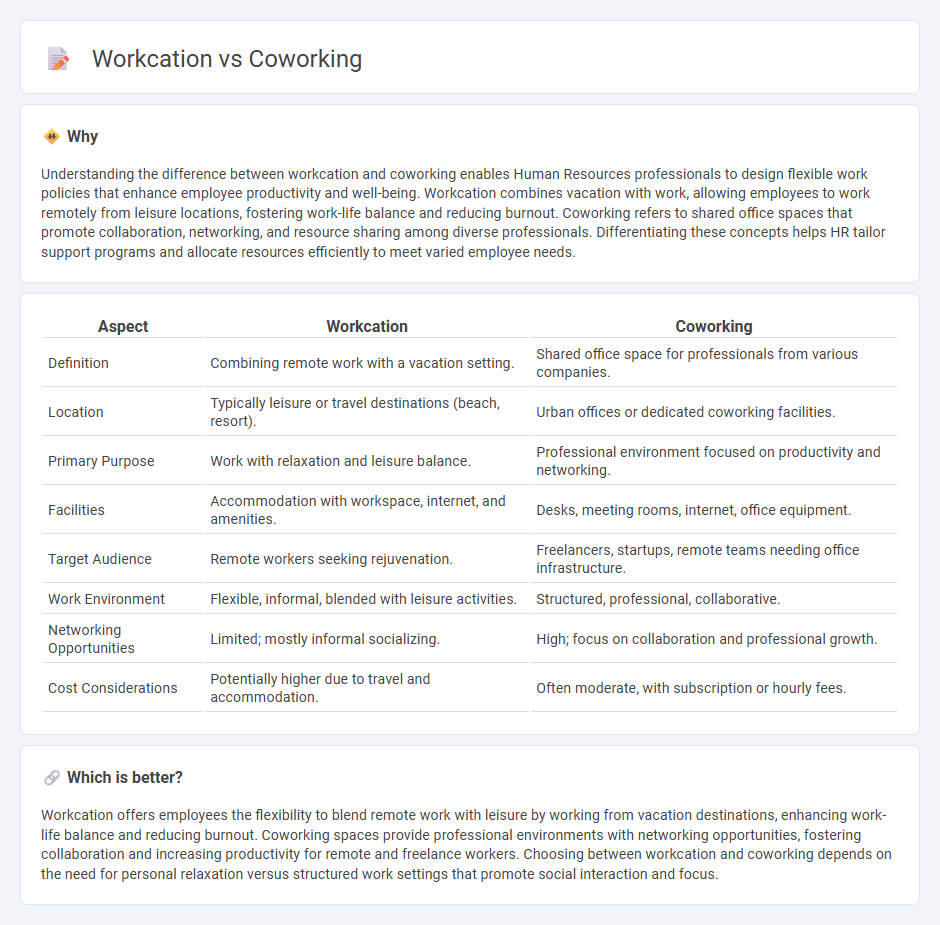
Workcation blends remote work with vacation, allowing employees to maintain productivity while experiencing new environments, boosting creativity and job satisfaction. Coworking spaces offer shared office environments that foster collaboration, networking, and flexibility for freelancers and remote workers. Explore the benefits and practical applications of workcation and coworking to enhance your professional lifestyle.
Why it is important
Understanding the difference between workcation and coworking enables Human Resources professionals to design flexible work policies that enhance employee productivity and well-being. Workcation combines vacation with work, allowing employees to work remotely from leisure locations, fostering work-life balance and reducing burnout. Coworking refers to shared office spaces that promote collaboration, networking, and resource sharing among diverse professionals. Differentiating these concepts helps HR tailor support programs and allocate resources efficiently to meet varied employee needs.
Comparison Table
| Aspect | Workcation | Coworking |
|---|---|---|
| Definition | Combining remote work with a vacation setting. | Shared office space for professionals from various companies. |
| Location | Typically leisure or travel destinations (beach, resort). | Urban offices or dedicated coworking facilities. |
| Primary Purpose | Work with relaxation and leisure balance. | Professional environment focused on productivity and networking. |
| Facilities | Accommodation with workspace, internet, and amenities. | Desks, meeting rooms, internet, office equipment. |
| Target Audience | Remote workers seeking rejuvenation. | Freelancers, startups, remote teams needing office infrastructure. |
| Work Environment | Flexible, informal, blended with leisure activities. | Structured, professional, collaborative. |
| Networking Opportunities | Limited; mostly informal socializing. | High; focus on collaboration and professional growth. |
| Cost Considerations | Potentially higher due to travel and accommodation. | Often moderate, with subscription or hourly fees. |
Which is better?
Workcation offers employees the flexibility to blend remote work with leisure by working from vacation destinations, enhancing work-life balance and reducing burnout. Coworking spaces provide professional environments with networking opportunities, fostering collaboration and increasing productivity for remote and freelance workers. Choosing between workcation and coworking depends on the need for personal relaxation versus structured work settings that promote social interaction and focus.
Connection
Workcation and coworking share a strategic connection by enabling remote employees to maintain productivity while benefiting from flexible work environments outside traditional offices. Both concepts emphasize collaboration, networking, and access to professional resources, fostering employee well-being and improving work-life balance. Integrating workcation with coworking spaces enhances talent retention and supports dynamic workforce management within Human Resources.
Key Terms
Flexibility
Coworking spaces offer unparalleled flexibility by providing professionals with access to dynamic work environments and amenities tailored to productivity, enabling seamless transitions between tasks and locations. Workcations blend work and leisure, granting individuals the freedom to balance professional responsibilities with travel experiences, often in inspiring settings that boost creativity. Explore how choosing between coworking and workcation can transform your work-life balance through enhanced flexibility.
Collaboration
Coworking spaces foster collaboration through shared environments, networking events, and community activities that encourage interaction among diverse professionals. Workcations blend remote work with travel, offering new settings that can inspire creativity but often lack the structured collaborative opportunities of coworking environments. Explore how these work models impact teamwork and productivity to find the best fit for your collaborative needs.
Employee Well-being
Coworking spaces enhance employee well-being by fostering social interaction, reducing isolation, and offering ergonomic work environments that boost productivity and mental health. Workcations combine work with travel, promoting relaxation, creativity, and stress reduction by changing the environment and breaking routine. Explore how these flexible work models impact employee satisfaction and wellness for your organization.
Source and External Links
Wikipedia: Coworking - Coworking is an arrangement where workers from different companies share an office space, enabling cost savings and convenience.
US Chamber: Benefits of Coworking Spaces - Coworking spaces offer shared business expenses, professional settings, and valuable connections for small businesses and freelancers.
Coworker: Best Coworking Spaces - Coworker is a platform for finding and reserving shared workspaces, including coworking desks, private offices, and meeting rooms with various amenities.
 dowidth.com
dowidth.com